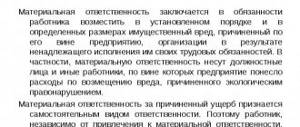Issues discussed in the material:
- What is meant by the financial responsibility of the chief accountant?
- In what cases does the chief accountant become fully financially responsible?
- What you need to know about concluding an agreement on full financial responsibility of the chief accountant
- Is it possible for the chief accountant to be financially liable after dismissal?
Often, company management, in order to save money, enterprises practice shifting responsibility to the chief accountant so that he pays the fine from his personal funds. However, the financial responsibility of chief accountants is strictly regulated by labor legislation. From our article you will learn how broad the financial responsibility of the chief accountant is.
In what case is the chief accountant liable?
The chief accountant in his activities must be guided by the provisions of Law No. 402-FZ of December 6, 2011 “On Accounting,” which replaced a similar regulatory legal act No. 129 FZ of November 23, 1990. These federal laws differ significantly: the responsibilities of the chief accountant are defined differently in them. The first Federal Law prescribed the chief accountant:
- develop the organization's accounting policies;
- maintain accounting records;
- prepare and submit financial statements;
- control the organization’s property;
- ensure that the company’s business operations are carried out within the framework of the law.
The new law stipulates that the chief accountant must only conduct accounting for the company. And the new Federal Law places responsibility for the legality of transactions, for control over the assets of the enterprise, for the organization and implementation of accounting policies, for the preparation and submission of reporting documents on the management of the company.
The correctness of these changes is beyond doubt, since the manager always has greater powers than his subordinate, and when the question arises of whether the organization operates within the framework of the law, the final word must remain with the director.
Organizing various processes in a company - preparing reporting documents, developing accounting mechanisms, etc. - is very difficult without involving administrative resources. Delegation of previous tasks by the head of the organization to the chief accountant is quite possible even now, but the director must still monitor their implementation and manage the processes.
The chief accountant, of course, must maintain accounting records, recording and reflecting each business transaction in registers. Accounting statements are based on accounting data; they can be requested for study:
- owners of the enterprise (shareholders);
- government bodies, including the Federal Tax Service and extra-budgetary funds, statistical bodies;
- banking organizations;
- business partners of the company.
Often the accounting department does not only accounting, but also tax accounting. She is also required to deal with statistical and management reporting.
Possible damage and its types
The following specific violations can be identified for accountants:
- Incorrect payroll and other errors when paying employees.
- Violation of cash discipline rules.
- Violation of rules related to accounting and reporting.
- Distortion of information reflected in documents.
- Errors in calculating taxes and deductions to extra-budgetary funds.
- The primary documents were prepared incorrectly, but were still accepted for accounting.
Due to each such violation, the enterprise faces real financial losses. Here are just some examples:
- Penalties and penalties from tax authorities.
- Reimbursement to the budget for tax claims from subordinates and contractors.
What does the financial responsibility of the chief accountant mean?
The chief accountant is hired by concluding an employment contract with him, and therefore the legal relations prescribed in the Labor Code of the Russian Federation are applicable to him.
The definition of the concept of “material responsibility” is given in labor legislation. The responsibility of the financially responsible person is to compensate for the harm caused to another person. The limits of financial liability of various categories of workers are defined in the Labor Code of the Russian Federation and federal laws. Thus, the law of July 12, 1991 No. 161-FZ states what military personnel are financially responsible for.
Risks
Thus, the main risks for both the company and the employee themselves are related specifically to the execution of documents - what specific wording is used in the employment contract:
- If there is no statement of full responsibility in the document, this is the most profitable option for the employee and the least acceptable for the employer. Then the risk arises that even if the damage is large, it will be impossible to recover it from the accountant - compensation is allowed only within 1 average monthly salary.
- If such a statement exists, it is most acceptable for the company and least beneficial for the accountant himself. Then the damage can be recovered in parts over a fairly large period, and in the end the entire amount should compensate for the damage caused.
An employee always has the right to demand changes to the employment contract (before signing it), but in practice, an employed accountant often has no choice. Therefore, you need to carefully study the employment contract and, if necessary, change the employer.
What is the difference between full and limited liability of an accountant?
The financial responsibility of the chief accountant to the employer is of two types:
- Full financial liability obliging to compensate the damage caused by the chief accountant to employees or the organization in full.
- Limited financial liability, the occurrence of which is regulated by the provisions of the Labor Code of the Russian Federation.
The chief accountant bears limited financial liability if he violated the job description unintentionally, and this caused harm to the company. The amount of recovery from him in this case is equal to the amount of his earnings for the month. This is established at the legislative level.
If the accountant bears full financial responsibility, then he is obliged to compensate the company for the damage caused in 100% of the amount. Full financial liability may be imposed on an employee if he signed the relevant agreement when registering an employment relationship or in accordance with Art. 243 of the Labor Code of the Russian Federation. But the current rules also prescribe the possibility of liability of this level in the following cases:
- If the damage was caused intentionally or while under the influence of drugs or alcohol.
- If the damage was caused in order to obtain financial gain, or there was a conspiracy with third parties (subject to this fact being established in court).
- If a commercial or state secret was disclosed, subject to signing a non-disclosure agreement with the employee during employment.
The amount of damage caused in such cases is determined by the court.
Conditions for the occurrence of financial liability in relation to the chief accountant
General provisions
Some general issues of collecting compensation from an employee are discussed in our article at the link: “Compensation for material damage by an employee to an employer.” The conditions for the occurrence of financial liability are (letter of Rostrud dated October 19, 2006 No. 1746-6-1):
- illegality of the behavior of the damage-causer;
- causation;
- guilt in committing the act.
In paragraph 4 of Resolution No. 52, the following circumstances are also considered to be of significant importance:
- absence of circumstances excluding the employee’s financial liability;
- presence and extent of damage;
- compliance with the rules for concluding an agreement on full financial liability.
Some general issues of proof are covered in the material “Full financial responsibility of the employee (nuances).” In relation to the position of chief accountant, some peculiarities arise in the interpretation of the requirements of regulatory acts.
What damage can be recovered from the chief accountant?
The most common reason for filing a claim for damages from the chief accountant is a decision by the tax authority to bring tax liability for incorrect calculations, late payment of tax payments, late submission of declarations and other documents, as well as additional assessment of taxes (contributions).
When considering such cases, the courts indicate that the arrears presented cannot amount to damage to the organization in the sense contained in Art. 238 of the Labor Code of the Russian Federation and paragraph 15 of Resolution No. 52, since the payment of taxes and contributions is the responsibility of the taxpayer, i.e., a legal payment (see the resolution of the Presidium of the Moscow City Court dated November 16, 2016 in case No. 44g-221/2016). Another thing is fines, penalties and other sanctions imposed on the organization as a result of an employee’s failure to fulfill his duties.
When does the chief accountant become financially responsible?
What does the concept of “real damage” include? This:
- raw materials, equipment and other property of the organization rendered unusable;
- monetary shortage or shortage of assets, the fact of which is recorded;
- expenses for paying imposed fines;
- costs for forced absences or downtime of employees;
- costs of restoring the organization's property.
Important: the concepts of “real damage” and “lost profit” are different! Lost profits are the loss of a certain part of income, for example, if, due to the fault of the chief accountant, some agreement was not concluded. An employer cannot demand compensation for lost profits from its employee.
In accordance with Art. 246 of the Labor Code of the Russian Federation, the consequence of damage is the loss of property, therefore, the chief accountant may be guilty of the following real damage: the accrual of penalties, fines, taxes based on the results of audits.
The Labor Code of the Russian Federation prescribes compliance with a certain algorithm of actions when establishing the guilt of an employee.
Firstly, the administration is required to conduct its own investigation to identify the causes of damage and assess it. A special commission created by order of the general director should investigate the situation.
Secondly, it is mandatory for the head of the company to request an explanatory note in writing from the chief accountant (Article 247 of the Labor Code of the Russian Federation). The chief accountant should be interested in drawing up this document, since, having explained himself, he can justify himself to the director. If he is unable to develop a solution that will resolve the situation and does not accept the explanation of the guilty employee, and the amount of damage caused is more than one salary per month, then the determination of the guilt of the chief accountant will have to be carried out in court.
Of course, the chief accountant should try to resolve the situation directly with the director, since employees are not always acquitted based on the results of court hearings. Let us take as an example case No. 33-1423 dated September 12, 2011 of the Kostroma Regional Court. The company was fined by the Pension Fund of the Russian Federation for the fact that the chief accountant did not submit personalized accounting information on time.
He was obliged to do this in accordance with the requirements of the job description. The full financial responsibility of the chief accountant was established in the provisions of the employment contract. The employer filed a lawsuit against its chief accountant to compensate for the damage caused. The court upheld the claim, and the organization won the case.
No evidence - no guilt
To bring the chief accountant to financial responsibility, you need not only to have a signed agreement, but also to prove that we are talking about real property losses, namely:
- that there were no circumstances that, by virtue of the current law, excluded the financial liability of the chief accountant;
- that his actions (or inaction) were illegal, that is, there was a direct violation of the law, local regulations, organizational and administrative documents, job descriptions, etc.;
- that there is a cause-and-effect relationship between the actions (inaction) of the chief accountant and the occurrence of material damage, and so on.
A brief explanation of the procedure for proving the above circumstances would be appropriate here. As a rule, all evidence is obtained as a result of control measures - checks of the availability of property (inventories and other procedures). To conduct such events, the head of the organization appoints commissions including specialists.
During the work, commission members receive the necessary written explanations from officials. Facts of refusal of certain persons to provide explanations are reflected by the commission in a specially drawn up act. The chief accountant has the right to familiarize himself with all materials of the audits carried out, as well as to appeal them.
Financial liability of the chief accountant after dismissal
The procedure for terminating an employment contract with chief accountants has its own peculiarities: in paragraph 4 of Art. 81 of the Labor Code of the Russian Federation specifies an additional reason for dismissal.
If the owner of the organization changes, then in accordance with Art. 75 of the Labor Code of the Russian Federation, the new owner has the right, no later than 3 months from the date of entry into ownership rights, to terminate employment relations with the management staff, including the chief accountant.
It is also possible to terminate the contract with the chief accountant at the initiative of management if facts of making unfounded decisions that resulted in losses or loss of property are revealed (according to clause 9 of Article 81 of the Labor Code of the Russian Federation).
In this case, the procedure is carried out without observing any special requirements. Therefore, if it is necessary to do an inventory, the extension by the company owner of the period of presence of the dismissed accountant at the workplace is not legal. It is mandatory to include an employee who hands over inventory items and to whom claims of a material nature can be made as part of the personnel involved in the inventory.
This is regulated by the Accounting Regulations (Order of the Ministry of Finance No. 34 of July 29, 1998). Proper inventory taking without the participation of the person who is financially responsible is quite difficult. The results of such an inventory can be challenged in court:
- each member of the commission conducting the inventory must be completely unbiased;
- the court may require production of work records to check whether they are falsified;
- if damage is discovered during the inventory process, it must be documented and confirmed to each member of the commission;
- the inventory must be carried out with the participation of independent expert auditors;
- if the court finds that the inventory results are distorted or reflected incorrectly, then it is possible to file a counterclaim on charges of slander (Article 129 of the Criminal Code of the Russian Federation), in which case the civil process will be transformed into a criminal one.
Disciplinary sanctions established by Art. 192 of the Labor Code of the Russian Federation, based on the results of an audit, audit of financial and economic activities (first a remark is made, then a reprimand, and then dismissal is possible), can be applied within 2 years from the date the employee committed a disciplinary offense.
In this case, the employer can bring the offending employee to disciplinary liability if he continues to work at the enterprise. If the chief accountant resigns, they cannot discipline him.
In this case, you can demand compensation for damage within 1 year from the moment the damage was discovered (Article 392 of the Labor Code of the Russian Federation).
Judicial practice on the issue under consideration (Decision of the Supreme Court of the Russian Federation No. GKPI02-112 of April 17, 2002) recognizes that the employer does not have the right to dismiss an employee “for making unreasonable decisions” (clause 9 of Article 81 of the Labor Code of the Russian Federation). Such dismissal has no legal force and is not enforceable unless there is evidence of compliance with the following conditions:
- the damage to the organization was caused directly due to a decision made by the chief accountant;
- the negative consequences could have been avoided by making a different decision.
It is necessary to clarify how the concepts of “decision” and “damage” used in this norm should be interpreted:
- the inaction of the chief accountant (processing documents later than the deadline, late submission of declarations), which became the reason for the application of penalties to the organization, is not a solution;
- The chief accountant, fulfilling his immediate job responsibilities, should not make decisions, but only state completed business transactions using accounting methods;
- damage such as damage or loss of property must be a consequence of guilty actions, that is, provided that the chief accountant is aware of the likelihood of negative consequences.
Procedure for collecting damages
The onset of liability does not occur at once - from the moment a violation is discovered, the company must carefully check these facts, demand an explanatory statement from the employee, and, if necessary, contact law enforcement agencies and file an application in court. The procedure looks like this:
- Upon the fact of the incident, the accountant’s immediate supervisor or personally the director of the company requests a written explanatory statement from her, which is drawn up in any form. In the document, the employee sets out his point of view on what happened, but he is not obliged to admit his guilt. If the accountant is sure that there was no mistake in his actions, it is better to immediately reflect this fact in the explanatory note, keeping 2 copies. If the employee categorically refuses to draw up a written explanatory statement, it is necessary to record this fact in the presence of witnesses (colleagues) and draw up an appropriate act.
- The company, represented by its management, immediately assembles a working commission that will investigate the incident over the next few days. The commission clarifies the facts, describes the causes and consequences of what happened. Based on the results of the internal investigation, a corresponding act is drawn up. In it, the commission clearly formulates its conclusions and names the culprit.
- If a direct cause-and-effect relationship is identified between the accountant’s actions and the damage, the employer has the right to compensate for the damage in accordance with the procedure prescribed above (but in any case, no more than 20% monthly of the average salary). Funds are withheld forcibly. If the employee does not agree, he has the right to file a complaint with the labor inspectorate or directly go to court.
If the amount of damage is large enough, the company also has the right to file a claim and initiate proceedings, including criminal proceedings. In the event that an employee admits his guilt, it is in the interests of management to request an appropriate explanation from him. Then the question of the procedure for compensation is decided - usually the amount is divided into several parts, and the amounts are deducted in installments. A payment schedule is drawn up and an agreement is signed. The document can be drawn up in any form; it is not subject to mandatory notarization.
About risks in connection with actions of a criminal nature
You can often find reports in the media about how chief accountants took advantage of their positions for personal gain. The fact that money passes through the hands of these people opens up a lot of opportunities for fraud. Tax evasion is one thing, but when seeking personal gain is another.
It is not easy to identify guilty actions such as embezzlement and forgery of documents, embezzlement of property, and organization of criminal schemes. Evidence for these facts is also quite difficult to find.
Here are some measures that will help protect against such problems in the future:
- When hiring, you must use agreements with the most precise wording.
- It is important to properly organize document flow in an enterprise.
- The powers and responsibilities of the chief accountant require division of powers and appropriate delegation.
- Periodic audits involving external or corporate employees.
- Hiring only subordinates with the appropriate level of qualifications for accountant positions.
- Careful selection of suitable candidates.
Selecting the type of responsibility
By default, the employee bears limited MO. In cases other than those listed in the first paragraph of Article 243 of the Labor Code, damages are recovered in the amount of no more than the average monthly salary in accordance with Articles 241 and 81 of the Labor Code.
A similar MO in such cases is borne by the cashier accountant , from whom, in addition to the amount of the shortfall, the fines paid by the organization under Articles 14.1, 15.1 of the Code of Administrative Offenses are fully recovered. Other accountants are liable (except for that stipulated in Article 243 of the Labor Code, clause 1) only in an amount not exceeding the average monthly salary.
When applying for a job in a large business organization, it is logical for an applicant for the position of chief accountant to insist on precisely this version of the agreement.
It is reasonable to extend these restrictions to sanctions under the Code of Administrative Offences, which in the practice of a large company can be frequent .
The manager must understand that losses can be recovered from an honest employee only within the limits allowed by his official income for a reasonable period, and sanctions on the enterprise can be imposed in amounts that are unrealistic for an individual.
Everything that is said above in relation to the chief accountant applies to a person working under a civil contract for the provision of consulting services on accounting, including legal (Chapter 39 of the Civil Code).
The legislative framework
Let's consider the legislative documents that regulate various forms of responsibility of the chief accountant:
- Criminal Code of the Russian Federation.
- Code of Administrative Offenses of the Russian Federation (in particular, Article 15.11.).
- Tax Code of the Russian Federation.
- Federal Law No. 129 of November 21, 1996.
Let's consider the regulatory grounds for criminal prosecution of the chief accountant:
- Federal Law No. 309.
- Article 144 of the Code of Criminal Procedure.
Depending on the severity of the offense, the chief accountant can be brought to disciplinary, material, administrative, or criminal liability. Disciplinary action applies to all employees. They are not specific to chief accountants.
How to hold an employee to full financial responsibility ?








